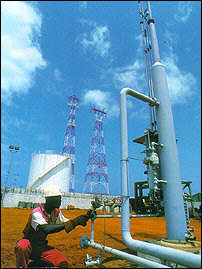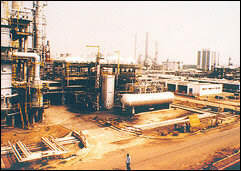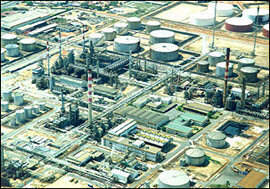 Mines and Energy, the second mainstay of the economy Mines and Energy, the second mainstay of the economy |

Having become of the priorities for national development, the Mining and Energy sectors benefit from incentives and much needed attention for its expansion. This is exemplified by the introduction of a new Mining Code and the updating of vital Mining and oil deposits. This voluntarist policy in the area of oil led to intensified oil, gas and mining exploration in 1993. For the Minister of Mining and Energy " Côte d'Ivoire's strategy is to consolidate on its position as a processing country with refinery activities as the first aspect ". In order to achieve this, the Minister underscored the fact that Côte d'Ivoire has the natural resources potentials in oil and gas. To achieve this goal, the support of the private sector will be needed. "Henceforth, the government will disengage from all productive sectors while leaving the private sector the leading position as the motor of the economy. It is left to the private sector to take initiatives and the risk to invest in a sanitized and secure environment brought about by the government " states the Minister.
Moreover, Côte d'Ivoire hopes to develop a big network for the purpose of selling white products (oil and diesel) in the entire subregion. To this end, Petroci Holding represent the Government in signing contracts with foreign consortiums. " We worked a lot with American companies. Petroci Holding does not give guarantee to these companies when it involves access to private funds " states Adama Bakayoko, Managing Director of Petroci Holding. In the production sharing contracts, the Government does not share in the exploration costs. When gas or oil is discovered, 40% of revenue is allocated to cost oil. The remaining amount or profit oil is shared between the Government represented by Petroci Exploration, Production and the Consortium. Generally, the sharing arrangement is: 40% for the Government and 60% for the private partner. However this percentage-based sharing arrangement may vary. Also, on bloc C-11 the sharing arrangement is 60% and 40% respectively.

The production of " Lion " oil field is 20 000 barrels per day. Ocean Energy is responsible for production on this oil field. However, the quantity of oil produced is quite small and ill-adapted to the the local refinery (SIR). This is why Côte d'Ivoire's oil is exclusively export-oriented. The Ivorian Refinery Corporation (SIR) import crude oil from Nigeria and refines it into finished products. Presently, the capacity of SIR is 5 million tonnes per year. At the end of the privatisation exercise, this capacity may reach 10 million tonnes per year with the creation of a second production unit. It is certain that the disparition of small refineries on the West Coast of Africa will enable SIR become a major supply unit for petroleum products in West and Central Africa.
Today, SIR is a State-owned corporation where the Government hold 47% of the capital. Many companies hold part of the capital. They are: Total, Elf; Shell, Texaco and Agip. The privatisation strategy earmarked the transfer of 37% of the capital to private investors. The Government will have to contend with only 10%. " Today, SIR hold 100% of the Ivorian market, 85% of the Malian market,and 35% of the Burkinabè market ", states SIR's Managing Director, Mr Noël Akossi Benjo. The Ivorian refinery has a capacity of 5 million tonnes plus 500 000 tonnes of the Mutinational Bitumen Corporation (SMB). The capacity is to be extended. " This will enable enable the corporation to export to Asia, United States and Europe at low cost and beome competitive worldwide " says Mr Noël A.Bendjo. The refinery export heavy diesel for use in cracker units in the United States.
With regards to compliance with environmental standards, Mr Noël A. Benjo stated that his corporation has an hydrocraker machine at its disposal for manufacturing sulphur-free products. The International Finance Corporation (IFC) even conducted an environmental impact evaluation in order to ascertain conditions for extension works.
For buying SIR, the duo François Bakou-Elf Aquitaine with the proposal of CFA F 44 billion succeded in the operation. Meanwhile the new authorities seem to show reservations concerning transparency in the conduct of the operation. Moreover, Petroci Industries and Services is responsible for the promotion of industrial hydrocarbons and allied products and follows with sustained interest the privatisation process at SIR. " We are committed to building a used-oil regenerating plant. The first phase of this project is industrial and the second phase will be environmental ", hints Ernest Koffi Koffi, MD of Petroci Industries and Services.
Concerning petroleum product distribution, Shell
oil comes up as the market leader. " Our
presence in most West and Central African countries
ans especially Côte d'Ivoire dates back to
the 1929. Côte d'Ivoire is one of the very
first countries in the region which offered Shell
real investment opportunites " states Shell's
Managing Director, Peter
Blauwhoff. In order to meet customer needs,
Shell went into the construction of mini-marts in
fuel stations. The objective was to enable customers
do their shopping while getting fuel supply. "
The strategies being set up presently are not
designed for our West and Central African region
only but also for the North African region. Morocco,
Egypt and Tunisia are presently offering Shell real
investment opportunities ", declares Mr
Blauwhoff. |
The objective of the Petroleum Product Management Company of Côte d'Ivoire (GESTOCI) is to guarantee the supply of security stock. Fuel distributors in Côte d'Ivoire hold part of the capital. The Government is represented by Petroci-Holding. According to the Managing Director, Konan N'Guessan the capacity of three Gestoci depots is close to 400 000 m3. " The turnover in 1998 is CFA F 9 billion " states the MD. This company supplies Mali to the tune of 500 000 m3 per year. Burkina Faso receive close to 100 000 m3. In May, a fire outbreak razed down a fuel storage tank of Gestoci. Damage done on the property was estimated at CFA F 4 billion. " Some expenses were already made. Others will be made in the short and long terms. However, we have strenghtened security " add Konan N'Guessan.

In the process of privatising Gestoci, the Government will hold 34%, fuel marketers will share out 54% including 10% for SIR. 10% will be distributed to the general public through the Regional Stock Exchange of UEMOA.
In the area of gas, bloc CI-or FoxTrot exploited by Bouygues and Apache Petroleum have started supplying gas to the country. Gas pipelines linking Jacqueville to Abidjan were built. A gas terminal was also built in Vridi (Abidjan). The gas produced by FoxTrot supplies the third termal station in Abidjan. The production of the first two years is estimated at 1 Million cubic feet per day plus 50 million in subsequent years. The reserves on this gas field are 25 billion cubic meters of gas including 15 billion available without enhanced gas recovery. The construction of a gas pipeline linking FoxTrot to Ghana is under way and will be funded by Britain's Commonwhealth Development Corporation. Côte d'Ivoire hopes to become the Rotterdam of Africa with implementation of the West African gas pipeline project linking Mauritania to Angola. Born out of the restructuring in the National Oil Operations company, Petroci Gas aims to ensure the enhancement of the country's off-shore gas potential as well as the potential expansion of the distribution and commercialisation of butane gas and other derivatives. " The intervention of Petroci gas on the butane gas market and the awareness programmes carried out to reach out to Ivorians spurred a substantial rebirth of consumption ", states Mrs Karidia Kouma, MD of Petroci Gas.
Concerning electricity, Côte d'Ivoire supplies Ghana, Togo and Benin. In the future, an interconnection with the power grids in Mali and Guinea is planned.
In the area of Mining, enourmous potentialities abound. In the western region, there are four major iron deposits: Mount Klahoyo, Mount Tia, Mount Gao and Mount Totrosegaye. The exploitation of Klahoyo deposits including the reserves is estimated at 700 million tonnes. This exploitation was already envisaged in the 70s by the Iron Minerals Union of Côte d'Ivoire (Cominferci).
This Union is made up of British Steel Corp(20%), Usinor (10%), Uremco (10%), Mitsubishi Corp, Nippon Steel Corp, Sumito Metal Industries, Sumito Shoji Khaisa Ltd (45%), Pickands Mather and Co (10%) and Sodemi (10%).
It was based on the production of 12 million shovefuls tonnes per year at the rate of 66% of enriched iron in a factory located in Binié on the mining site.
Côte d'Ivoire has many bauxite sites in Bongouanou region (250 km North of Abidjan) and Nickel in the western part of the country. The Mining Development Corporation of Côte d'Ivoire (SODEMI) through its subsidiaries and in association with French and Canadian partners carry out mining activities in two gold mines. The Ity Gold Mines Company in a 60/40 partnership between Sodemi and the operator carry out mining activities on Ity gold mine (Toulepleu, Western region). The Afema Gold Mines Company (SOMIAF) in a 32/68 a partnership between Sodemi and Eden Roc, a Canadian company and Marshall, the American group carry out mining activities on the Anviri Ampiri gold Mine (Aboisso district, Eastern region). The production of these two mines was 46 tonnes of gold in 1994. Ghana produces tonnes and South Africa 600 tonnes compared to world production of 1 200 tonnes.
Concerning eletricity, the country hopes to speed up the electrification process of the localities. From 1 100 in 1994, the number of electrified localities increased from 1 600 over a total of 8 000. The objective is to provide the population with abundant, quality and cheap electricity.
Apart from national coverage, Côte d'Ivoire is poised to capture the subregional market. It sells electrical energy to Ghana, Benin and Togo. The proposed project with Mali is under way. Proposals already exist on Guinea and Liberia. In order to attain self-sufficiency in energy supply Côte d'Ivoire, within the framework of works of the Elephant of Africa, conceded the construction and exploitation of Azito thermal station with a capacity of 420 MW to the private sector. Already, 120 MW were installed. The installed capacity will increase to 1 500 MW with the completion of the final phase of Azito thermal station. Up until 1997, water energy represented 60% and thermal energy 40%. From 1952 to 1990 the entire energy sector development policy fell under the responsibility of the Electrical Energy Company of Côte d'Ivoire. " The Government of Côte d'Ivoire decided to concede the management of energy production, transport and distribution to a private operator in 1990 ", explains Mr Chevalier, MD of ANARE. For him the National Energy Sector Regulation Authority (ANARE) has three basic missions to fulfill: counselling to the Government, mediation in conflicts arising between energy operators and protecting the interest of consumers. |

